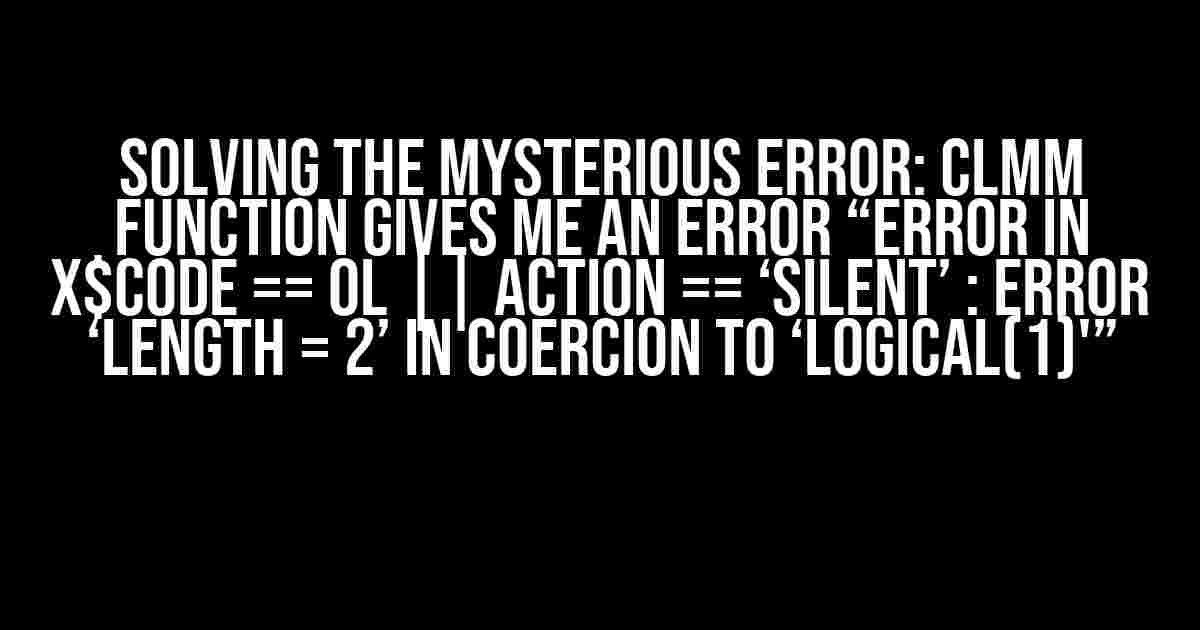Introduction
Are you tired of encountering the frustrating error “Error in x$code == 0L || action == ‘silent’ : Error ‘length = 2’ in coercion to ‘logical(1)'” when using the clmm function? You’re not alone! This error can be perplexing, especially for those new to R programming and statistical analysis. In this comprehensive guide, we’ll delve into the world of clmm functions, explore the reasons behind this error, and provide step-by-step solutions to resolve it.
What is the clmm Function?
The clmm function is a part of the ordinal package in R, used for ordinal regression analysis. It’s an essential tool for researchers and data analysts to model the relationship between an ordinal response variable and one or more predictor variables. The clmm function is specifically designed for cumulative link mixed models, which allow for the analysis of ordinal responses with random effects.
Common Use Cases for clmm Function
- Analyzing patient responses to a survey with ordinal scales (e.g., Likert scales)
- Modeling the relationship between an ordinal response variable and continuous predictor variables
- Accounting for random effects in ordinal regression models (e.g., clustering, nesting)
Understanding the Error Message
Before we dive into the solutions, let’s break down the error message:
<code>Error in x$code == 0L || action == "silent" : Error 'length = 2' in coercion to 'logical(1)'</code>
In essence, this error occurs when R is attempting to coerce a vector of length 2 into a single logical value (a Boolean value, TRUE or FALSE). This coercion fails because R doesn’t know how to compress the vector into a single logical value.
Possible Causes of the Error
- Inconsistent data types: Mismatched data types in the formula or input data can lead to this error.
- Invalid formula syntax: A mistake in the formula syntax, such as missing or extra parentheses, can cause the error.
- Data quality issues: Errors in the data, such as missing values or outliers, can affect the clmm function’s performance.
Solutions to the Error
Now that we’ve identified the possible causes, let’s explore the solutions:
Solution 1: Check Data Types and Consistency
Verify that all variables in the formula have consistent data types. Ensure that:
- Numeric variables are numeric (not character or factor)
- Factor variables are indeed factors (not numeric or character)
- Ordinal variables are correctly coded as ordinal (not continuous)
Solution 2: Review Formula Syntax
- Count the number of parentheses and ensure they match
- Verify that all variables are separated by commas
- Check for missing or extra arguments in the clmm function call
Solution 3: Clean and Preprocess Data
Inspect the data for:
- Missing values: Impute or remove them accordingly
- Outliers: Identify and handle them using robust methods or transformations
- Data encoding: Ensure correct encoding of categorical variables
Solution 4: Update R and Packages
Make sure you’re running the latest versions of R and the ordinal package:
<code>update.pkg("ordinal")</code>
Solution 5: Debug the clmm Function Call
Break down the clmm function call into smaller components to identify the issue:
<code>
# Step 1: Create the formula
formula <- as.formula("response ~ predictor1 + predictor2")
# Step 2: Prepare the data
data <- data.frame(response, predictor1, predictor2)
# Step 3: Call the clmm function
clmm(formula, data = data)
</code>
By breaking down the code, you can isolate the specific component causing the error.
Conclusion
In conclusion, the “Error in x$code == 0L || action == ‘silent’ : Error ‘length = 2’ in coercion to ‘logical(1)'” error when using the clmm function can be resolved by:
- Ensuring consistent data types and syntax
- Reviewing formula syntax and data quality
- Updating R and packages
- Debugging the clmm function call
By following these steps, you’ll be well on your way to resolving the error and successfully using the clmm function for ordinal regression analysis. Remember to stay vigilant and methodical in your debugging process, and don’t hesitate to seek additional resources if needed.
Additional Resources
If you’re still struggling with the error or need further guidance, consider exploring:
- The official R documentation for the ordinal package
- Online forums and communities, such as Stack Overflow or Reddit’s r/learnprogramming
- Tutorials and guides on ordinal regression analysis and the clmm function
With patience, persistence, and practice, you’ll master the clmm function and conquer the world of ordinal regression analysis!
| Keyword | Description |
|---|---|
| clmm function | A part of the ordinal package in R for ordinal regression analysis |
| Error ‘length = 2’ in coercion to ‘logical(1)’ | An error occurring when R attempts to coerce a vector into a single logical value |
| Cumulative link mixed models | A statistical method for modeling ordinal responses with random effects |
Sidebar: clmm Function Example
<code>
# Load the ordinal package
library(ordinal)
# Create a sample dataset
data <- data.frame(response = c(1, 2, 3, 1, 2, 3),
predictor1 = c(10, 20, 30, 10, 20, 30),
predictor2 = c("A", "B", "C", "A", "B", "C"))
# Define the formula
formula <- as.formula("response ~ predictor1 + predictor2")
# Call the clmm function
clmm(formula, data = data)
</code>
This example illustrates a simple ordinal regression analysis using the clmm function. Remember to adapt the formula and data to your specific research question and dataset.
Call to Action
Now that you’ve learned how to troubleshoot and resolve the “Error in x$code == 0L || action == ‘silent’ : Error ‘length = 2’ in coercion to ‘logical(1)'” error, it’s time to put your new skills into practice! Grab your dataset, fire up R, and start exploring the world of ordinal regression analysis with the clmm function.
Frequently Asked Question
Are you stuck with the “Error in x$code == 0L || action == “silent” : Error ‘length = 2’ in coercion to ‘logical(1)’ ” error when using the clmm function? Worry no more! Here are some frequently asked questions and answers to help you troubleshoot and resolve this issue.
Q1: What is the main cause of the “Error in x$code == 0L || action == “silent” : Error ‘length = 2’ in coercion to ‘logical(1)’ ” error?
This error occurs when the clmm function is trying to coerce a vector of length 2 to a logical value of length 1. This can happen when the clmm function is used with incompatible data types or when the data is not properly prepared.
Q2: How can I troubleshoot this error?
To troubleshoot this error, you should check the data types and structure of your input data. Make sure that the data is in the correct format and that there are no missing or null values. You can also try to isolate the specific part of the code that is causing the error by breaking it down into smaller chunks and testing each chunk separately.
Q3: Can I use the clmm function with categorical data?
Yes, you can use the clmm function with categorical data. However, you need to ensure that the categorical data is properly coded and prepared. You can use the as.factor() function to convert categorical variables into factors, and then use the clmm function accordingly.
Q4: Can I use the clmm function with missing data?
No, you cannot use the clmm function with missing data. The clmm function does not support missing data, so you need to remove or impute the missing values before using the function. You can use the na.omit() function to remove missing values, or use a imputation method such as mean or median imputation.
Q5: Are there any alternatives to the clmm function?
Yes, there are alternatives to the clmm function. You can use other R packages such as lme4 or MASS, which provide similar functionality. The lme4 package provides a more flexible and powerful way of fitting linear mixed-effects models, while the MASS package provides a simpler and more straightforward way of fitting linear models.


